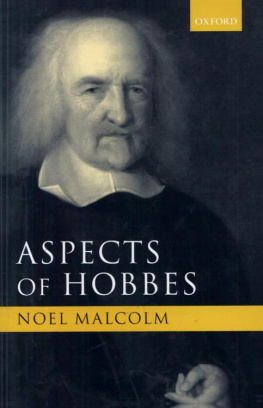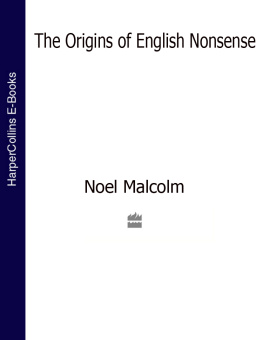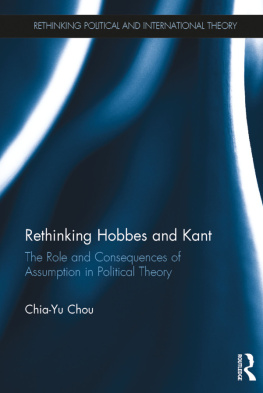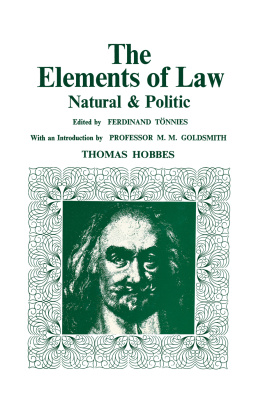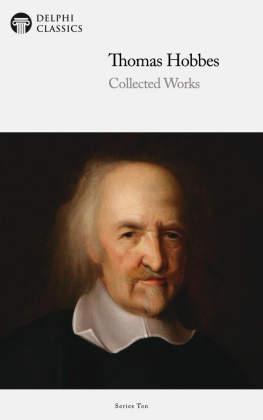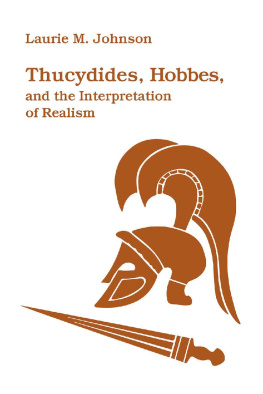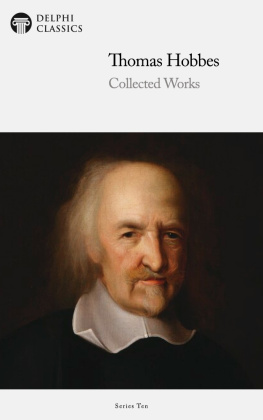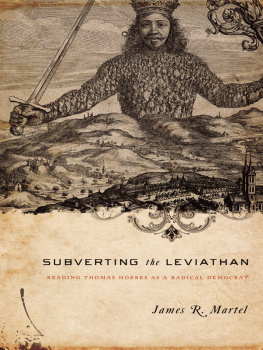Malcolm, Noel , Senior Research Fellow, All Souls College, Oxford Aspects of Hobbes Print publication date: 2002
Published to Oxford Scholarship Online: November 2003
Print ISBN-13: 978-0-19-924714-1
doi:10.1093/0199247145.001.0001 Abstract: Presents a set of extended essays on a variety of aspects of the life and work of the philosopher Thomas Hobbes (15881679). Some have previously been published as journal articles, etc., but two-thirds of the material in this book is new. While each essay may be read independently of the others and in any order, there are two introductory essays (Chs. 1 and 2), which nonspecialists may prefer to read first. The topics covered include Hobbes's political philosophy, his theory of international relations, the development of his mechanistic world-view, his Biblical criticism, and the European reception of his thought.
Keywords: Hobbes
|
Aspects of Hobbes Noel Malcolm, one of the world's leading Hobbes scholars, presents a set of extended essays on a wide variety of aspects of the life and work of this giant of early modern thought. The greater part of this volume is published here for the first time. Malcolm offers a succinct introduction to Hobbes's life and thought, as a foundation for his discussion of such topics as his political philosophy, his theory of international relations, the development of his mechanistic world-view, and his subversive biblical criticism. Several of the essays pay special attention to the European dimensions of Hobbes's life, his sources and his influence; the longest surveys the entire European reception of his work from the 1640s to the 1750s. All the essays are based on a deep knowledge of primary sources, and many present striking new discoveries about Hobbes's life, his manuscripts and the printing history of his works. Aspects of Hobbes will be essential reading not only for Hobbes specialists, but also for all those interested in seventeenth-century intellectual history more generally, both British and European. end p.ii |
|
Aspects of Hobbes CLARENDON PRESS OXFORD end p.iii |
|

Great Clarendon Street, Oxford ox2 6dp
Oxford University Press is a department of the University of Oxford
It furthers the University's objective of excellence in research, scholarship,
and education by publishing worldwide in
Oxford New York
Auckland Bangkok Buenos Aires Cape Town Chennai
Dar es Salaam Delhi Hong Kong Istanbul Karachi Kolkata
Kuala Lumpur Madrid Melbourne Mexico City Mumbai Nairobi
So Paulo Shanghai Taipei Tokyo Toronto
Oxford is a registered trade mark of Oxford University Press
in the UK and in certain other countries
Published in the United States
by Oxford University Press Inc., New York
in this volume Noel Malcolm 2002
The moral rights of the authors have been asserted
Database right Oxford University Press (maker)
First published 2002
All rights reserved. No part of this publication may be reproduced,
stored in a retrieval system, or transmitted, in any form or by any means,
without the prior permission in writing of Oxford University Press,
or as expressly permitted by law, or under terms agreed with the appropriate
reprographcs rights organization. Enquiries concerning reproduction
outside the scope of the above should be sent to the Rights Department,
Oxford University Press, at the address above
You must not circulate this book in any other binding or cover
and you must impose this same condition on any acquirer
British Library Cataloguing in Publication Data
Data available
Library of Congress Cataloging in Publication Data
Malcolm, Noel.
Aspects of Hobbes/Noel Malcolm.
p. cm.
Includes bibliographical references and index.
1. Hobbes, Thomas, 1588-1679. I. Title.
B1247 .M35 2002 192dc21 2002074932
ISBN 0-19-924714-5
end p.iv |
|
For I. L. M. in memory end p.v |
|
Preface This book gathers together fourteen essays. Seven have previously been published as articles in journals or chapters of collective volumes, and sevenmost of them much longer than the previously published itemsare printed here for the first time. All of them relate more or less directly to the life and works of Thomas Hobbes, but some extend into other areas of subject-matter too, such as Virginian history, Comenianism, Spinoza, or the development of biblical criticism. (In just one case, that of the essay on Pierre de Cardonnel, the Hobbesian element in the essay plays a secondary role; I hope readers may share my feeling that the story of de Cardonnel himself is of sufficient interest to justify the attention given to it here.) Some of the studies are biographical, and some are bibliographical or textual; this is partly a reflection of the fact that several of these essays are 'parerga', preparatory or supplementary labours carried out while working on two larger projectsa biography of Hobbes, and a critical edition of Leviathan. With the exception of the two introductory essays (on Hobbes's life and his political theory), this book does not try to provide any sort of general survey of Hobbes's life and works; the topics handled here are ones that happen to have caught my interest during many years of research on Hobbes, and on which I have thought I had something new to say. But I hope that the variety of subjects dealt with here will at least give a sense of the range of Hobbes's own interests and activities, from epistemology, optics and scientific method to biblical interpretation and international relations theory. While the flow of new books and articles on Hobbes grows larger year by year, the vast majority of them concentrate on just a small range of topics (in his political philosophy) and on an even smaller range of texts. His political theory is not, I hope, neglected in this book; but I also hope that these essays will help readers to see Hobbes not as an isolated political philosopher, but as someone connected in all sorts of different ways with the cultural and intellectual life of his age. With the exception of the two introductory pieces, the essays in this book are arranged in a rather approximate chronological order of subject-matter. However, each essay is a self-contained piece of work: no cumulative knowledge is presumed in the reader, and the items may therefore be read in any order. (Those who do not already have some specialist knowledge of Hobbes may prefer, nevertheless, to read the two introductory essays first.) No changes have been made to the texts of the previously printed items, apart from typographical corrections and the standardizing of the references to sources. On a few pointsthe dating or attribution of some manuscripts, for exampleI have revised my opinions since those items were first published. But I have felt that it would be unfair to readers, who may wish to refer end p.vii |
|
equally to this printing or the original publication of these pieces, to oblige them to hunt for tiny textual differences between the two. Therefore, I have left the unrevised opinions in the text, and have merely added, at the end, an 'Additional Note' in which the revised judgement (or, in some cases, new information) is presented to the reader. |
|
|

